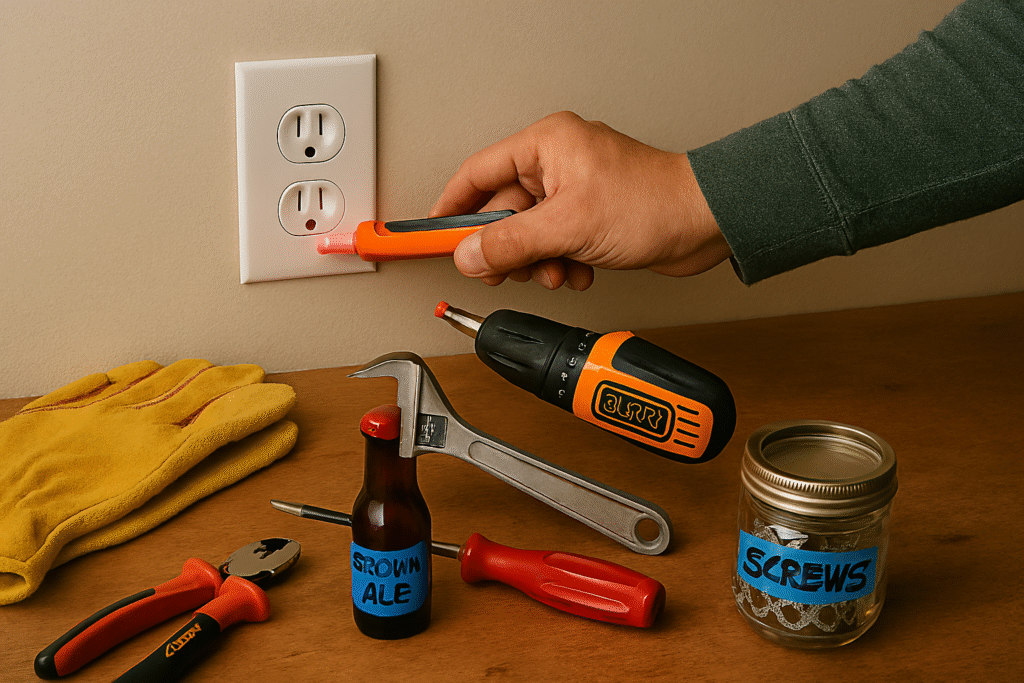Working with electricity can be empowering—literally. A little knowledge and the right precautions can save you money, make your home safer, and give you confidence to tackle projects without calling in a pro for every flickering light. That said, electricity isn’t something to take lightly. Safety first, always.

Safety First (No Exceptions!)
- Turn Off the Power: Always switch off the breaker before working on any circuit. Then test it with a voltage tester — trust, but verify.
- Use the Right Tools: Check out our Budget Tools That Work Hard page for affordable, reliable electrical tools like insulated screwdrivers, wire strippers, and testers.
- Know Your Limits: If you’re in over your head, call a licensed electrician. There’s no shame in being alive to try again another day.
Essential DIY Electrical Skills
- Replacing Outlets & Switches: One of the easiest upgrades for beginners. Swap old two-prong outlets for grounded ones, or replace a worn-out switch with a modern rocker style.
- Installing a Light Fixture: Make sure the electrical box is rated to support the fixture’s weight. Always connect ground wires. Check out our Power vs Hand Tools guide to understand which tools make these jobs easier.
- Understanding Breakers: Label your breaker panel clearly—future you will thank present you.
- Wire Nuts & Connections: Tight, clockwise, and secure. Give them a gentle tug test before pushing wires back into the box.
Pro Tips for Smarter Work
- Leave Slack in Wires: Extra inches of wire in the box make future repairs and upgrades easier.
- Upgrade to LED: Not only do LEDs save energy, but they also generate less heat in fixtures—safer and cheaper long term.
- Use GFCI & AFCI Protection: Especially in kitchens, bathrooms, garages, and outdoor areas. These can save your life from shocks and prevent electrical fires. Learn more on our Home Safety / Electrical Safety guide.
- Plan for Future Loads: Adding a home office or workshop later? Run heavier gauge wire or larger conduit now—it’ll save headaches later.
Must-Have DIY Electrical Tools
Here are some reliable, budget-friendly tools to keep in your kit:
- Klein Tools Voltage Tester (Amazon) – Simple, safe, and a must before touching any wire.
- Ideal Wire Strippers (Ace Hardware) – Clean, accurate stripping without nicking wires.
- Greenlee Circuit Breaker Finder (Amazon) – No more running back and forth flipping switches like a game show contestant.
- Southwire Fish Tape (Ace Hardware) – Essential for pulling wires through walls or conduit.
When to Call a Pro
DIY has limits. If you’re considering:
- Rewiring an entire house
- Upgrading your electrical panel
- Running new circuits to kitchens, bathrooms, or outdoors
- Or if you hear buzzing, smell burning, or see sparks
…step back and make the call. You can still proudly say you did the safe part: knowing when to hand it over.
⚡ Bottom line: DIY electrical work is all about safety, preparation, and respect for the power running through your home. With the right tools, knowledge, and common sense, you can handle plenty of small projects yourself. Explore our Creative Uses & Pro Tips page to get even more mileage from your tools.
